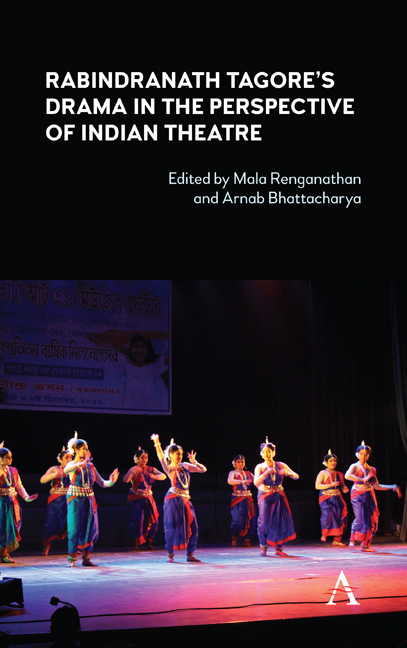Chapter 5 - Tagore and the Indian Tradition of Hasyarasa: A Study in Tagore’s Shorter Humorous Plays
Published online by Cambridge University Press: 20 January 2022
Summary
The theory of rasa holds a pivotal status in Indian aesthetic theory, and its origin dates back to 200 to 500 CE in which the classical treatise Nāṭyaśāstra, traditionally ascribed to Bharata Muni, came to be written. However, the term ‘rasa’ had been in vogue long before Bharata Muni used it for aesthetic purpose, and it had multiple connotations that varied from time to time and from text to text. Etymologically, the word ‘rasa’ is composed of two letters ‘ra’ which means ‘to give’ and ‘sa’ which means ‘motion’. V. S. Apte has given various meanings of rasa, like ‘to flow’, ‘to make wet all over’, ‘to taste’, ‘to relish’, ‘to soak’, ‘water’, ‘potion’, ‘fluid’, ‘liquid’, ‘sauce’, ‘condiment’, ‘happiness’, ‘charm’, ‘elegance’, ‘beauty’ and so on. ‘Rasa’ is also the name of a mythological river that flows in the region called Rasatala (Rasa = river + Tala = floor). The use of the word ‘rasa’ is as old as the Vedas themselves. In Rg Veda, rasa means ‘water’, ‘juice of plant’, ‘liquor’, ‘drink’, ‘sap’; in Yajur Veda it means ‘joy’; in Sama Veda it means ‘liquor’; in Atharva Veda it means ‘sap of herbs’, ‘sap of grain’ while in Satapatta Brahama the meaning of rasa is interpreted as ‘honey’, ‘syrup’, ‘elixir’, ‘mixture’, ‘juice’. In Brhadaranyakopanisha, rasa gets mentioned, meaning ‘water’, ‘essential element’, ‘vital part’ and the like. Rasa appears in Indian epics as well, in different shades of connotations, In the Ramayana, rasa means ‘any mixture’, ‘elixir’ or ‘portion’ whereas in the Mahabharata, it means ‘milk’, ‘liquor’, ‘drink’ and ‘melted butter’.
In Chapter 6 of his treatise Natyashastra, however, Bharata Muni has categorically defined four major rasas or sentiments which he believed to be integral to dramatic performances. In conceptualizing the sentiments, or rasas, Bharata Muni describes them as the sthayibhava or tastes of the dominant states or of the mind. Although, Bharata Muni has not offered any precise definition of sthayibhava, he views them as a combination of different states or bhavas. The Sage, has, however, defined three special bhavas: (1)bibhavaor determinants, which are actually a mental condition induced by the physical environment and which can be equated to ‘impulse’, (2) anubhava, or consequents, which are emotional expressions of the bibhava and (3) sancharibhava, or transitory mental state, which suggests fitful moods or emotions.
- Type
- Chapter
- Information
- Publisher: Anthem PressPrint publication year: 2020



